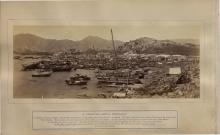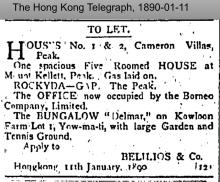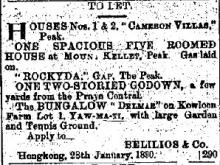Location aproximate - Shaded area is roughly Farm Lots 2 & 3.
History of the property:
The first plots of land sold in the area were not originally building lots; they were known at the beginning as "farm lots" and were sold by public auction. Two of the first lots, namely F. L. 2 and 3, of a total area of five acres, were bought by Mr. Delfino Noronha from the original owner, and he subsequently acquired an additional lot consisting of a further five acres of land adjoining his first purchase. He then invited his friend Mr. Marcus Calisto do Rozário to become joint owner with him of this land. Mr. Rozario agreed, and as a distinctive name for the property, the partners adopted the initial syllables of their Christian names. Thus it came about that the estate came to be called "Delmar".
The grounds of "Delmar" were a feature of the estate. Here were planted Australian fir and pine trees, which grew to a fine height. In one section, palms known as the areca, or betel-nut, as well as coconut palms, and other specimens of tropical flora, all well spaced out, gave it the appearance of a tropical plantation. In addition, fruit trees, flowering shrubs, and a host of other plants, including vegetables in abundance, flourished luxuriantly at "Delmar".
Through his connection with the shipping trade, Mr. Marcus Callisto do Rozario on one occasion succeeded in importing a number of Australian sheep with the object of creating an experimental sheep farm at Yaumati. However, owing to the unfavourable climate and the complete absence of suitable pasturage for the animals, the experiment proved a failure. The entire flock died one after, another. The proprietors of "Delmar" realising the futility of further trials, gave up their short-lived venture in animal husbandry.
The foreshore of Yaumati Bay, before the Government permitted the breaming of trading junks and sampans, was a beautiful, sandy beach and was, for some time, one of the most popular bathing resorts on the mainland. In the hot summer months, "Delmar" offered many attractions to the families of their joint owners, as well as their friends, who came over from the Island on picnic excursions and week-end visits.
But Government soon realised that a time was fast approaching when Kowloon would cease to remain merely a rice and vegetable growing district. A proposal was put forward by the then Surveyor General (as the Director of Public Works was called in those days), Mr. James M. Price, recommending the conversion of the Farm Lots into Inland Lots – in other words, building-lots – with compensation to owners for any portion of their land surrendered for public roads. Mr. Price's suggestion was eventually put into effect, and it applied to Yaumati and all the other villages in Kowloon Peninsula.
This led to greater interest being taken in Kowloon. Before long a foreshore site was sought on the western side of the Peninsula of Kowloon suitable for the construction of a graving dock. The enquiry was the result of a contention between two groups of shareholders in an already existing Dock Company. The "bulls" party endeavoured to force up the price of the Company's shares; the "bears," on the other hand, were for pushing it down. The side selected for the projected new dock was "Delmar", which, with its extensive foreshore rights, was one of the most valuable sites in the area. A representative of one of the contending groups of shareholders then approached Mr. Noronha with a view to its purchase. He was offered a small sum for an option, but the old Portuguese gentleman was shrewd enough to insist on an out-and-out sale. He sold the property to the share speculators for a tidy sum, but though "Delmar" passed out of the hands of its Portuguese owners the projected dock never materialised. Mr. Noronha never told whether the share speculators really intended to carry through the dockyard scheme, or whether, having cleared sufficient profits from their "ramp," they were glad to get rid of the land at some sacrifice. Nor did he ever reveal the identity of the would-be dockyard builders!
Besides the "Delmar" estate, Mr. Noronha bought land for Chinese shops and tenements in another part of Yaumati some distance from "Delmar". At his death, this property was disposed of; but had his heirs retained in they would have owned property which subsequently, with the merging of Yaumati into "Greater Kowloon," with its hundreds of thousands of inhabitants and its scores of thriving industries, became very valuable indeed.
There were other Portuguese owners of farm-lots in Yaumati besides Mr. Noronha and Mr. Rozário. Mr. José M. d'Almada e Castro bought a garden lot, with a small "sugar-loaf" hill on it abutting on the northern boundary of "Delmar." Opposite Mr. d'Almada's land was a plot of ground, also with a hillock, owned by Mr. J. A. Remedios (this "J. A." must not be confused with the pioneer Remedios, "João Jose," the founder of the firm of Messrs. J. J. dos Remedios & Co.). On the summit of the hill, Mr. Remedios built a small house as a week-end residence and picnic resort for his family and friends, and called it "Bimini" after his wife.



Comments
My great great grandfather's home
Thank you so much for posting this. Delfino Noronha was my great great grandfather.
Kowloon Farm Lots
Farm lots on Hong Kong. Island didn't have a prefix. These lots were "Kowloon Farm Lots" KFL